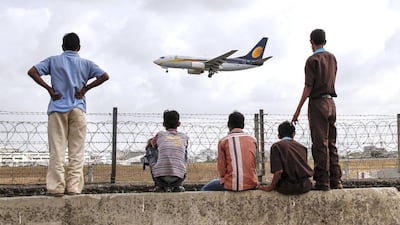Etihad's latest equity alliance in India could be its most significant to date as its US$600 million investment in Jet Airways opens up a vast and expanding market.
Building market share through equity stakes has defined the expansion of the carrier in recent years as it announced one deal after another from Ireland to Australia. Mammoth orders for new aircraft, such as the $67 billion in orders placed at last month's Dubai Airshow have also set it apart from all but its largest Arabian Gulf rivals.
But it is policy not planes that is powering Etihad ahead as government backing provides lift to its expansion at a time when many European carriers and hubs are hobbled by regulatory pressures.
“In the new world order of the 21st century, [Etihad] is so well placed to be able to grow,” said John Strickland, the director of JLS Consulting.
The International Air Transport Association (Iata) yesterday highlighted the significance of government support in the expansion of Middle East carriers as it predicted the region would experience the strongest passenger growth through 2017, running at about 6.3 per cent. Regional governments recognised “the value of the connectivity provided by aviation to drive global trade and development”, Iata said in its Airline Industry Forecast.
The equity alliance strategy has already improved connectivity between the capital and the capitals of Europe and Asia, while also benefiting the tourism industry of Abu Dhabi by funnelling more visitors through the emirate. It comes at a time of unprecedented growth for the regional aviation industry with the UAE alone expected to add more than 29 million passengers in total between 2013 and 2017.
Like its other equity stakes in Air Seychelles, Swiss Darwin Air, Virgin Australia and others, the Jet Airways deal is set to direct thousands more travellers through Abu Dhabi on long-haul routes.
It is also an especially important acquisition for the carrier as India constitutes Abu Dhabi tourism’s largest source market. Furthermore, the investment in Jet allows Etihad to reap revenues from the popular US-India route.
But like its previous investments, the Jet deal is not without risk.
Etihad has acquired stakes in “a very diverse mix of airlines, some of which have known financial problems, and require a lot of restructuring,” said Mr Strickland. Etihad must be wary of “the extra workload and complication involved in managing this day-to-day”.
With a larger number of acquisitions, the complexity increases. But the airline’s financial clout and backing provide a strong buffer.
Abu Dhabi’s “non-stop or one-stop reach, the range of [Etihad’s] newer aircraft, the product and price credentials and airport capacity” each provide “reason to think Etihad can grow in a sustainable way”, Mr Strickland added.
At November's Dubai Airshow, Etihad announced 199 new orders from Boeing and Airbus, meaning that it now has 285 planes on order and 72 in active service.
It comes at a time when airport capacity in the UAE is growing fast. With the completion of its Midfield Terminal, Abu Dhabi International Airport will host 47 million passengers annually by July 2017. That's more than five times as many passengers as the UAE has residents.
The rapid expansion of Etihad and other Gulf carriers such as Emirates Airline and Qatar Airways, along with their respective hubs, comes as some major European airports face limits to their capacity to grow. Acrimony has dogged British plans to build a third runway at Heathrow, while night flights were banned at Frankfurt after complaints from locals about its new fourth runway.
Between 2007 and 2013, Heathrow, Paris, Frankfurt and Amsterdam added a total of 11.7 million new passengers, while Doha, Dubai and Abu Dhabi added 35 million, according to the Centre for Asia Pacific Aviation. A plan to establish immigration pre-clearance for transit to the United States may make Abu Dhabi a more attractive hub.
The Centre for Asia Pacific Aviation believes that “there are few better holistic examples of airline-airport-government policy working together”. It’s easy to see why.
“European governments take note”, it said.
abouyamourn@thenational.ae

